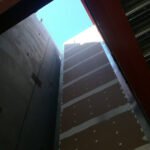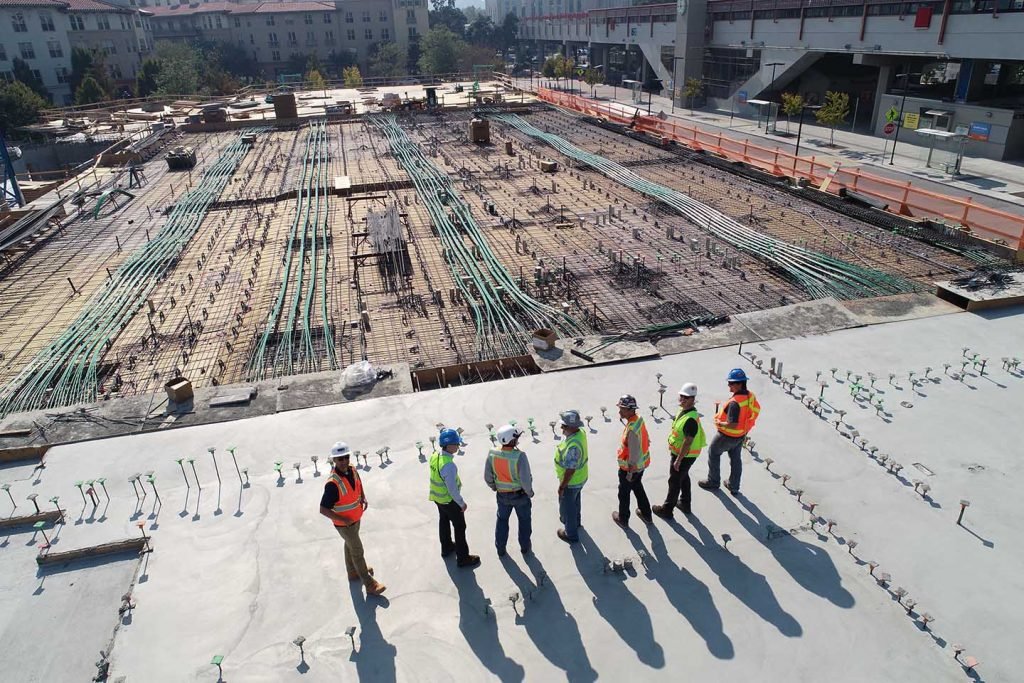


The modular industry as a whole continues to grow and as a result modular elevators rise in popularity as well. For example, in 2019 permanent modular construction surpassed the $250 billion dollar mark in construction starts. It was only $173 billion in 2015. The modular elevator rise in units sold is mirrored at MEM. What was an industry that placed just a handful of units annually, has now grown beyond expectations. We have a full production schedule, had to double the factory floor space in 2021 and we are now adding additional shifts to cover the upward trend.
The result of that growth is this month’s blog regarding projects produced a good dilemma to have. In November we had more than just a few elevators to choose from for the project spot light. We hit double digits with ten projects put in place in just the past 30 days. That makes our choice hard for the blog, so we went with photos from several projects. This growth can be attributed to our nationwide efforts, high-quality engineering and a team that supports each and every elevator we put in place.










As the largest producer and industry leader we are excited by our expanding reach as seen in the projects pictured. More and more architects, building owners, design build firms, modular companies and general contractors are exploring their options for low and midrise projects. But we are more than a modular company. Although we have seen a steady rise in modular projects, modular construction remains only a fraction of our mix. Traditional new construction and retrofit applications make up the rest.
We also provide a solution for a wide variety of building types as well. The kinds of projects we set this month include at: a university, a medical, government projects and housing. Each was set on time and in less than four hours. With the MEM system, you get to determine when you want your elevator. Try that with traditional elevators.

So, here is the point. When I started in the modular industry and in particular the modular elevator industry there was a real hurdle of acceptance as an alternative to traditional construction. There was a lot of push back despite modular being greener, faster, more efficient and higher quality. That has changed. Now for low and midrise applications modular is quickly becoming the standard, especially with elevators. Our industry is no longer on the bleeding edge of advancement but the cutting edge, just where everyone wants to be.
If you have a project coming up, have seen modular elevators rise in popularity and want to explore the possibility, just click the button below. We can give you pricing for your project location across the US and Canada. If you want to see behind the curtain and how we produce our modular elevator solution, just click the link for a live virtual tour. It would be our pleasure to show you around and answer any questions.

Confusing Elevator Talk – In a recent Zoom conference with an architect, a simple question was posed, “Are elevators confusing on purpose?” The question made me stop in my tracks. This is the same thought that crossed my mind many times in doctor’s offices. Just replace the word “elevators” with “medicine”. It made me wonder, has our industry gotten to that point?
I’ll get to my answer in a minute but, first let me give you some context. Just prior to our online meeting my caller had just left another confab with a sales representative from a big elevator company. The salesperson was pressing for answers on a project regarding the elevator. That ball was being tossed between the architect who called me, the building owner and the construction manager. All three had questions before they pulled the trigger.
In the meeting it was discussed that the proposed elevator did not meet all the specs called out in the plans. So the architect had more queries. The owner of the building was fearful of hidden costs regarding the long-term maintenance and proprietary components. Finally the construction manager just wanted to know the particulars of the shaft and project timing. They went into the meeting thinking that they would get straightforward answers and clear their clouded minds.
Instead, none of the questions were answered in any understandable fashion and hence the Zoom call, the question and a little bit of venting.
It took a more than a couple seconds to gather my thoughts. And a few ummmhs to consider what was asked fully.
When my stammering ceased, my answer was an unsurprising yes and no. I went on the explain that of course elevators are confusing but, not on purpose. They are complex machines and usually the largest moving object in any building so very specific terms have been developed over time that means very specific things (here are a few examples). If you are outside of the elevator industry, sometimes those words can be complicated and muddy the conversation.
It is like eavesdropping on a team of doctors pondering possible treatments to an ailment. In all likelihood you would hear words that seem confusing, jargon stuffed paragraphs and three-letter abbreviations that make no sense to the vast majority of people outside of the medical profession. If I had to make a judgement call on healthcare issues based upon the inside discussions of a group physicians, I would most assuredly be confused. I am not a doctor and trust me that’s a good thing. So my limited knowledge would produce a poor outcome. That outcome would be paralysis of thought and real bad decision making.

Elevator chatter can likewise be the same. If you get in a room of elevator consultants, engineers and technicians and listen to what is being said, it would be the dizzying. Inside jokes would fly over your head and technical terms would land on deaf ears.
In the medical example, with a proper best bedside manner it all becomes clear when the doctor emerges from the circle of peers and speaks to the patient…or at least it should. My point is that elevator folks need to remember the audience when they are answering questions and discussing issues. Humility not hubris is needed and clear everyday language is the requirement not inside baseball jargon. This is not because our customers are too stupid understand! They are busy beyond belief with dozens of other building systems to manage and the elevator is just one piece. The burden is on us to clearly communicate.
But yes, elevators are complex in some ways and are confusing. They don’t need to be made confusing.

On the other hand, for years I have had the unenviable task of trying to explain elevators in simple terms. It can be done! The premise of modular elevators is that we can make high-quality commercial elevators easy to understand, purchase, set and start up. This can be hard as we are taking all the engineering of a modular tube-steel hoistway and putting all the elevator components inside the hoistway in a factory. Elevator complexity times two.
This manufacturing process must be done with the highest precision and quality assurance. The engineering must be spot on and the product must leave the facility ready to start up once up-righted at the site and the electricity is supplied. All this must be explained plainly and easily.
So, I know elevators can be made easy to understand because at MEM we have the chore of not only explaining the elevator but, the modular hoistway as well. It just seems that some in our industry gain some real pleasure in speaking over peoples heads. That arrogance leads to confusion.
Arrogance may just be the tip of the confusion iceberg however. I am convinced and so are a lot of other people in the industry that make it hard to understand intentionally. The purpose is to confuse the potential customer so selling up is easier.
Everyone that deals with old-fashioned, conventional elevators companies already knows this is at least true in part. What other motive can there be for hiding true costs? Why would they breeze over the obvious purpose of proprietary parts? What is the motivation behind the installation process being so overtly laborious and difficult to comprehend? How can the contract being filled with so many exclusions, ifs, wherefores and seemingly more fine print then a contract from Willy Wonka be explained?
One answer may lie in the words of the English philosopher and statesman who among other things developed the scientific method – Sir Francis Bacon. He is credited with saying that “Knowledge is power.” Unfortunately, there is a thought that withholding that knowledge from people will produce control and ultimately wealth. This is not a new notion.
The phrase “Knowledge is power” actually predates Bacon by centuries and contains a darker tone.
“Knowledge is power and it can command obedience. A man of knowledge during his lifetime can make people obey and follow him and he is praised and venerated after his death. Remember that knowledge is a ruler and wealth is its subject.”
Imam Ali – Nahj Al-Balagha (The Way of Eloquence) – Saying 147.5
That quote seems to be the credo of many in the elevator business. If confusion can reign and information withheld, those holding the knowledge can exploit those who don’t have it. Let me say as loudly as possible this is not necessarily a scheme or plot of an evil genius. It is an observation of human behavior. If you need an elevator, only a few have the knowledge to help and they are in control…until the advent of the modular elevator. By breaking away from the old, outmoded way producing and distributing elevators, we changed the way we talk about them as well.
So, there is an option if you have ever felt like asking the question, “Are elevators confusing on purpose?” and you are tired of confusing elevator talk. If you are not getting clear concise answers, contact us.
MEM has a dedicated force of sales representatives that are more knowledgeable than any other. We love selling elevators, but equally we love explaining them and answering questions. It is what we do; we honestly assess your needs, answer your questions and give you information in a way that will be less painful than a trip to the doctor’s office. If you have a project in mind, just click the button below to get started.
Never miss a blog post again. Sign up for our monthly email newletter. Get important information about elevators, the modular industry and more.
